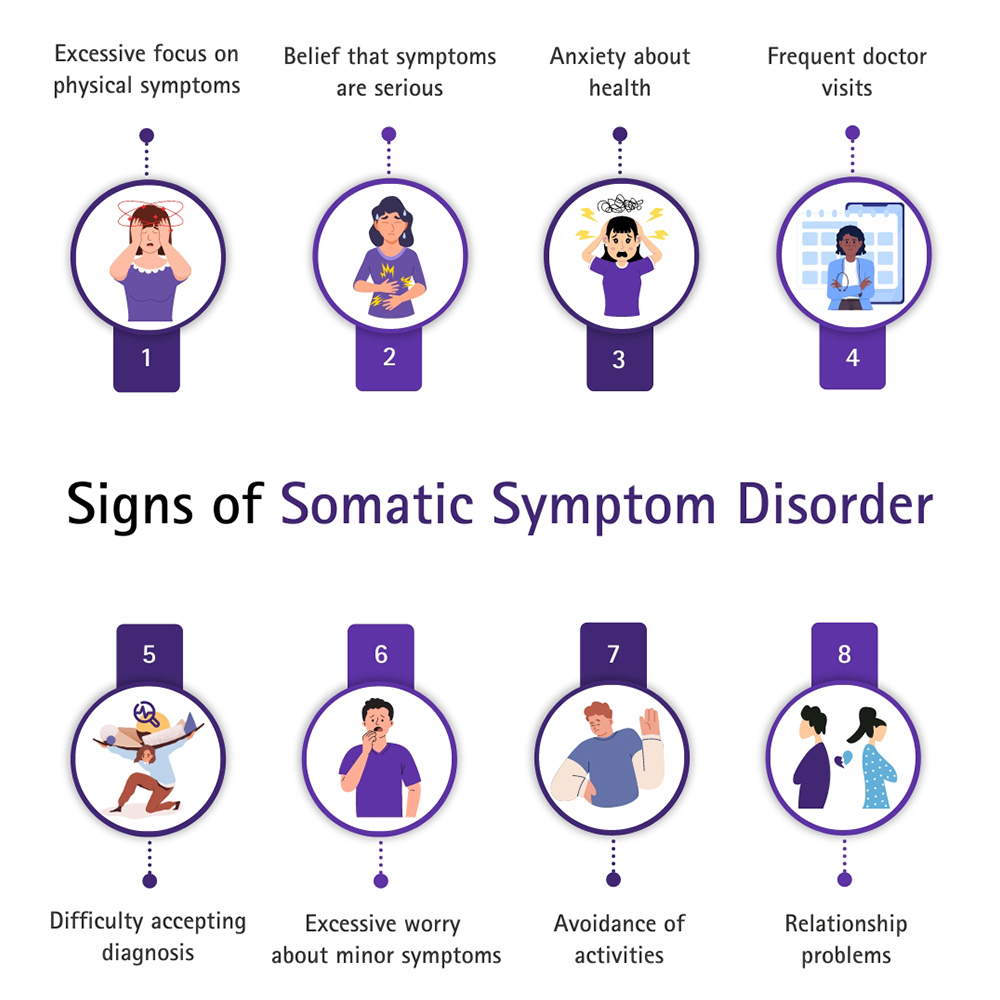Signs of Somatic Symptom Disorder: What It Looks Like

Somatic symptom disorder (SSD) is a mental condition in which people experience somatic, or physical, symptoms that are not explained by a medical condition. SSD can impact many areas of life, such as work and personal relationships. People with this diagnosis may miss school or social engagements due to concerns regarding their health. People with this diagnosis may get multiple medical evaluations, even when reassured there are no underlying medical issues.
SSD clients usually also reject the notion that symptoms are psychosomatic even when medical tests are negative. Somatic symptom disorder is a real condition that causes significant distress. If you or someone you know may potentially have SSD talk to a therapist. Treatment is available for this mental disorder.
Symptoms of Somatic Symptom Disorder
Symptoms of SSD include:
- One or more somatic (physical) symptoms that cause distress and disruption of daily life
- Excessive time, energy, and anxiety spend on the somatic symptoms
- Somatic symptoms present for 6 months or more
Psychotherapy and cognitive behavioral therapy (CBT) help treat SSD.

Causes of Somatic Symptom Disorder
The causes of somatic symptom disorder may differ depending on the person, however, some causes include:
- Past traumatic experiences
- Chronic stress
- Personality traits
- Lack of coping skills
- Family dynamics
- Brain chemistry
Not everyone who has these risk factors will develop SSD. A therapist can help you understand the underlying causes of SSD and develop a treatment plan specific to you.
Embrace Healing The Power of Trust in Therapeutic Relationships
“In my experience, the most effective aspect of therapy is the therapeutic relationship. Establishing trust between a client and clinician is the first step to healing.”
Psychotherapeutic Treatment of Somatic Symptom Disorder
Proven treatments for somatic symptom disorder include:
- Cognitive behavioral therapy
- Mindfulness-based therapy
- Psychodynamic therapy
- Stress reduction techniques
Early intervention is important for SSD. Treatment should be tailored to each individual. Therapy may work best with the collaboration of the therapist, client, and family.
Medications for Somatic Symptom Disorder
Medications are not the first line of treatment for somatic symptom disorder but may be helpful in combination with psychotherapy.
Medications for SSD include:
- Antidepressants- fluoxetine (Prozac), sertraline (Zoloft), escitalopram (Lexapro)
- Anti anxiety medications- lorazepam (Ativan) or clonazepam (Klonopin)
- Pain medications- nonsteroidal anti-inflammatory drugs (NSAIDs) or acetaminophen
- Muscle relaxants- cyclobenzaprine (Flexeril)
- Antipsychotic medications- aripiprazole (Abilify) or quetiapine (Seroquel)
Medications are not used to treat SSD but may be used to treat co-occurring symptoms of SSD such as depression and anxiety.
How to Get Help for Someone With Somatic Symptom Disorder
Helping someone with SSD can be challenging, but the most important thing to help your loved one is your understanding and empathy.
Here are some things you can do to help someone with SSD:
- Educate yourself: Learn about the symptoms, causes, and how to find professional help for SSD.
- Encourage professional help: SSD is difficult to deal with on your own, but with a therapist it is treatable.
- Offer support: Be there for your loved one. Sometimes this means offering advice and at other times it may just be listening.
- Participate in family therapy: Therapy can provide education on the diagnosis, treatment, and how to support your loved one with SSD.
- Practice self-care: The better care you take of yourself, the better you can help others.
- Avoid enabling: Keep your loved one accountable for participating in self-care activities.
Remember that as a family member, you can provide support, although this does not replace the important role of a therapist. Only a professional can help treat the underlying causes of SSD.
Don’t let somatic symptom disorder hold you back any longer. Contact us now to schedule your initial session and take the first step toward lasting healing.

